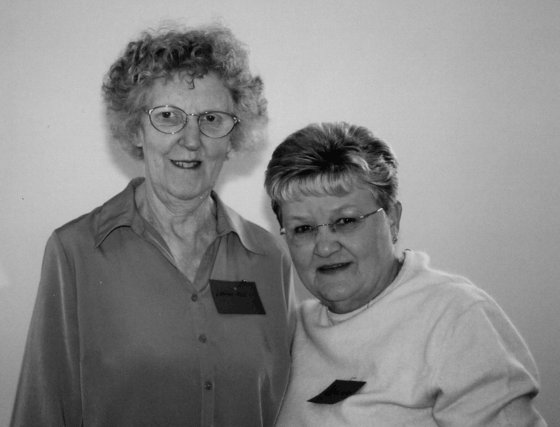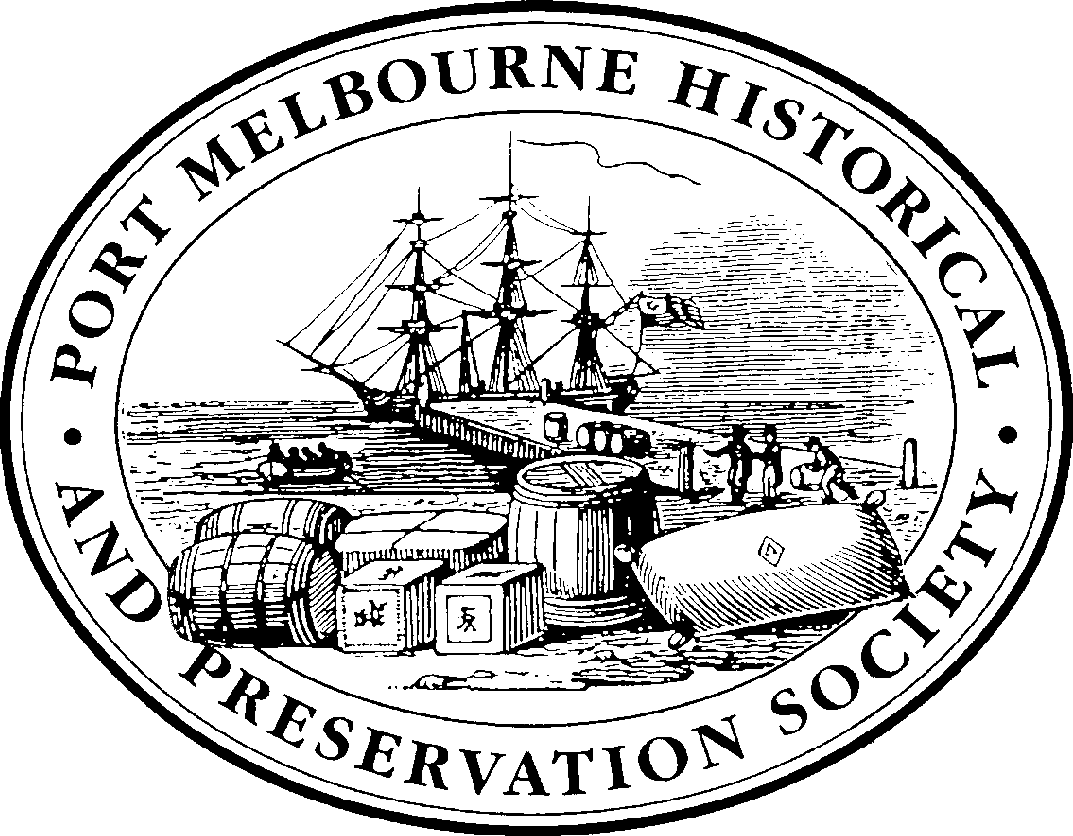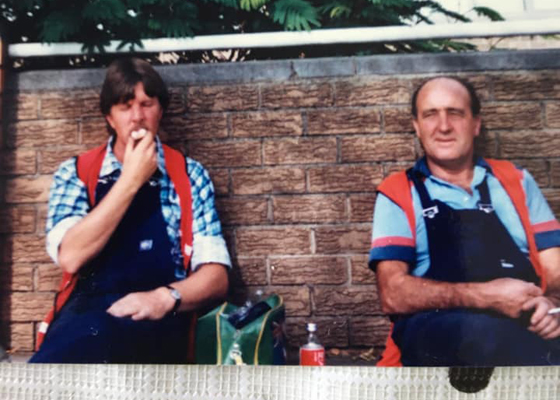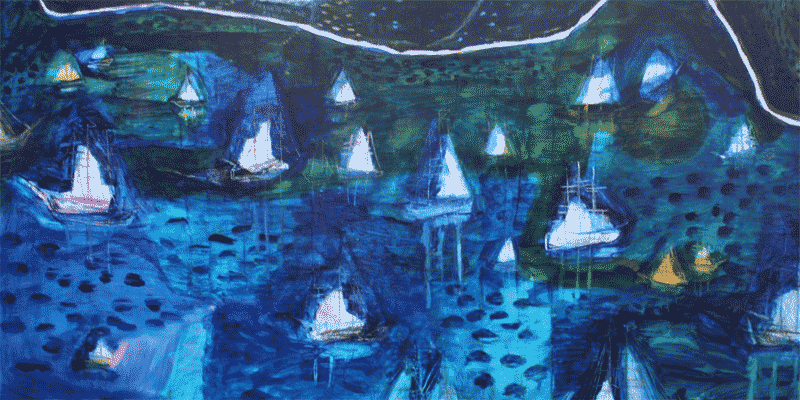Hall of Remembrance
by Greg Hansen
At last year’s annual general meeting, I reflected on what it was like for my wife Sherrie and I to have made Port Melbourne our home these past 30 years. My thoughts had little to do with anything I might have learned or could tell about the history of Port – rather, they were connected to the personal experience of our immediate neighbourhood and the people who resided there.
Living just around the corner from us in Poolman Street were Lorraine and Ken Hall. I’d seen Ken to nod to as he strode down Albert Street in his overalls. In our early Port days, he still worked for the local council, and I recall him wielding a shovel and tidying up our stretch of the street (a vignette you’d rarely see these days).
Ken’s demeanour struck me as forthright, even a little tribal. Indeed, he looked like the sort of character I’d expect to find in Port. For a newcomer like myself, he had a presence that I assumed was almost ancestrally rooted in Port’s working-class past.
If, as new arrivals, Sherrie and I felt foreign to the communal narratives of our new home, Ken (like many of our nearby neighbours) wasn’t about to let matters rest at that. Our Albert Street cottage required a bit of TLC and one day, while working out front, Ken was passing down the middle of the road (I never thought to ask where he was headed; was it The Clare Castle or Hibernian?) when he promptly stopped, turned, and wandered over.
“Gidday,” he said, “we’re having a meeting on Monday night.”
“Ah-huh,” I answered, faking comprehension but then compelled to ask, “Who?”
“The Society.”
“The what?”
“At St Joey’s.”
“Where?”
“I think you’ll find it interesting. 7.30. See you there.”
Fortunately Jim Power, our neighbour from across the way, was able to fill me in and expand on the location. Such, then, was my introduction to the fledgling Port Melbourne Historical and Preservation Society, an organisation whose membership was like some spontaneous combustion of protectionism for locally endangered heritage and identity. As foundation adherents of the Society (members 23 and 24), the Halls were happy to recruit newcomers to its groundswell, and this had the benefit of forging a connection between established residents and more recent arrivals.
As it transpired, the person who seemed like the quintessential Borough man to me wasn’t from Port Melbourne at all. Ken hailed from rural Whittlesea and drove milk trucks down to Woodruffs Dairy. (Whittlesea, incidentally, was the post-war destination of my wife’s English family.) To my mind, Ken had always resembled a waterside worker but, no, milk was what actually drove him into town. With Lorraine and their young children, they moved to Port and eventually bought the house in Poolman Street, just around the corner from where we would later live. His employment included 20 years with Woodruffs and 20 years at the Port Melbourne Council.
As a member myself, now, of the Society, it wasn’t long before Ken recruited me to assist in the recovery of a certain artefact – something wooden, long and decidedly heavy (an item related to the pier, if I remember correctly) – and operationally directed, of course, by that maestro of foraging, Jim Hillis. Because we were moving the said object under cover of darkness, I enquired of my puffing companions whether our seemingly clandestine activity was properly sanctioned.
“Of course,” replied a mildly affronted Ken. “It’s an orphan; it no longer has a home.” Then, with sentimental reassurance, he added, “We’re going to look after it.”
In that tradition of orphanage and adoption, a juvenile tabby cat one day turned up on our doorstep. After a week of wavering, Sherrie and I decided to give it a home. Duly named Grayson, the foundling (now well fed) grew into a feline of menacing stature, wary of strangers but attracted to back fences and territorial exploration. Dinner always brought him home.
Then one day, Grayson failed to return. “He’s just having a night on the town,” I told Sherrie. “He’ll be back in the morning”. But he didn’t come back. And for the next week there was no sign of him. I stared at the abandoned food bowl and duly leaflet-dropped the neighbourhood. Still nothing.
Then one evening, returning forlornly home from work, there was a message on our answering machine: “Gidday, it’s Ken Hall, here. You might want to pop around. I’ve got something of yours…”
I scarcely had an opportunity to knock before Ken flung the door wide open, a watermelon grin animating his face as he gestured grandly into the narrow hallway behind him. And there was the anti-social Grayson, now smooching up to him as if to enquire, Who’s this, Ken, disturbing our dinner time…
Lorraine angled her head from the kitchen to call out, “We’ve been feeding him steak. I hope that’s alright? He seems to like it…” Having been locked in a shed or some such thing, Grayson eyed me coolly – See, I’m fine, and they cook my food here…
Ken and Lorraine, of course, were regular attendees at the Society’s monthly meetings, and Lorraine was a stalwart of its supper preparations. One never failed to say hello; the Society was a perfect vehicle for neighbourly catchups.

With the passage of time, however, and the debilitating circumstance of ill health, Ken and Lorraine’s absence from later meetings attenuated that small but regular connection. When Ken, who had been looking after Lorraine, finally died in March 2018, the funeral service at Holy Trinity (which was standing room only for many of us) afforded an opportunity to review and celebrate his life: his family loves and work, his political affiliations and commitment to social justice. It was humbling, in the flow of tributes, to listen to those who had properly known him and his family.
Lorraine, herself, was in respite at this stage, having injured herself in a fall. At Ken’s funeral she understandably cut a frail but dignified figure, closely surrounded by family, and condoled by the many for whom another thread of Port Melbourne’s fabric had been cut. Not having seen Lorraine in such a long while, I joined the queue to pay my respects and, having proffered my sympathies, her face lit up with a sudden thought.
“Remember,” she said, “when we looked after Grayson?”
That souvenir of memory surprised me, and I returned the smile she beamed at me.
“Such an affectionate cat. And he loved steak…”
Three years later, Lorraine (by then in permanent care and no longer visible) finally passed away, bringing to a definitive close our slender connection with these neighbours from around the corner. The Poolman Street house, vacant for some time, was subsequently sold to new owners – a generational turnover, I suppose, resembling the arrival of our earlier selves in Port.



6 Comments
Belinda
Greg, I just wanted to say what a wonderful piece of writing this was to read.
Ken and Lorraine were my wonderful and much loved Nan and Pa. Reading of your connection with them has brought tears to my eyes. Nan and Pa loved Port and it’s so easy to see why.
Reading about Grayson, I am not surprised at all that they’d been feeding him steak!! That was Nan and Pa, to a tee! They loved all animals.
Thank you for taking the time to write such a wonderful reflection.
David Thompson
Thank you Belinda,
Ken and Lorraine, your Nan and Pa, were stalwarts of our Society and are much missed. Greg has perfectly captured a small part of their lives and we too are grateful he agreed to write this piece for the website. I have passed you comments directly on to Greg.
Belinda
Thanks David,
They loved the Historical Society, it was one of their many passions. Greg has captured them so perfectly in this piece. I’ve shared it with family and everyone agrees that it is a wonderful read. Thank you so much for honouring their memory in this way.
David Thompson
You are most welcome.
Ebony
Such a heartwarming piece of writing ♥️ Greg most certainly captured the essence of Nan and Pa in this.
I especially love the watermelon smile, that’s is exactly how Pa answered the front door to us a kids.
They loved Port and all of their friends, neighbours and fellow historical members.
David Thompson
Thanks Ebony
So glad the Hall family have enjoyed Greg’s story.
David Thompson